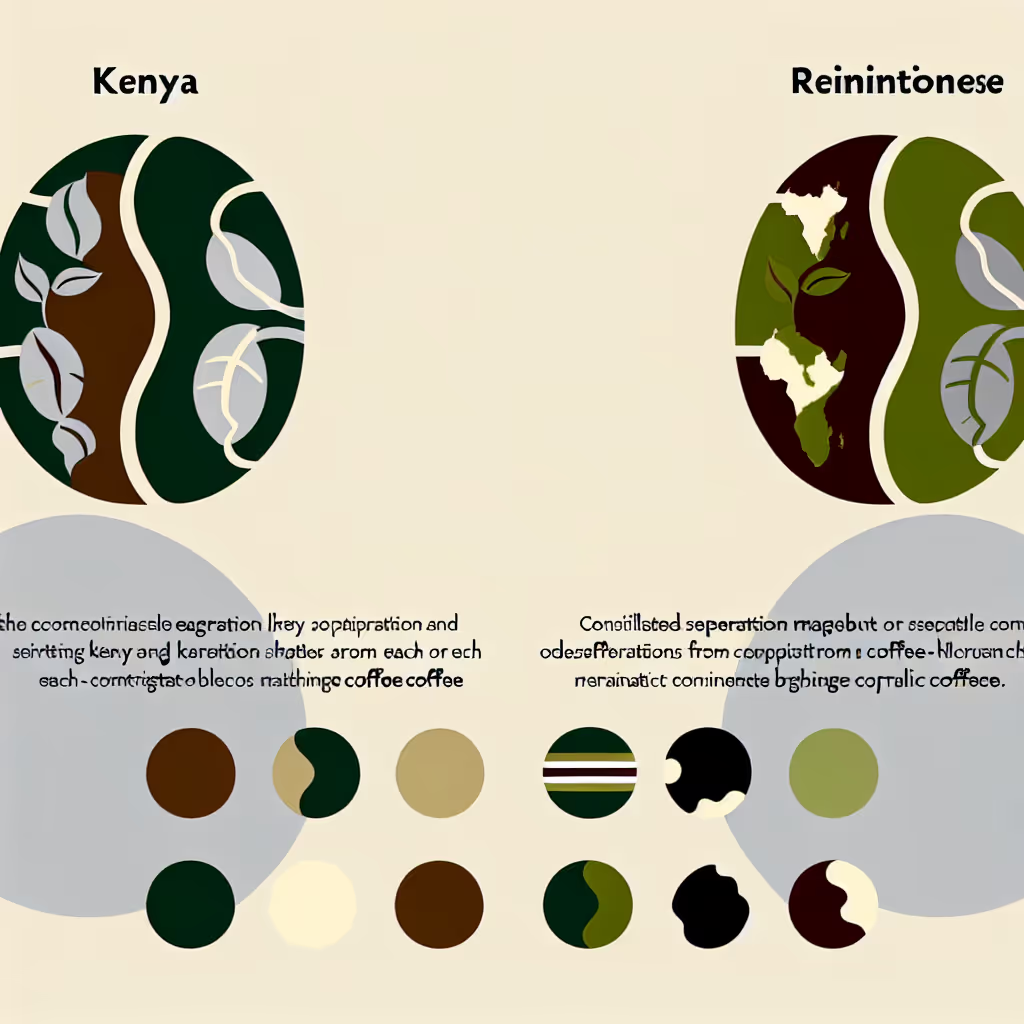Kenyan Vs. Taiwanese Coffee
This comparison explores the unique qualities of Kenyan and Taiwanese coffee, highlighting their distinct flavor profiles, growing conditions, and cultural significance in the specialty coffee world.

Brief Description
Kenyan coffee is renowned for its bright acidity, full body, and complex flavor profile. Grown in the rich volcanic soils of the Central Highlands, these beans benefit from ideal climate conditions and meticulous processing. The result is a cup that's bold, wine-like, and often described as the 'connoisseur's choice'. With notes ranging from blackcurrant to citrus, Kenyan coffee offers a truly unique and memorable tasting experience.
Taiwanese coffee is a hidden gem in the specialty coffee world. Grown in the lush, mountainous regions of Taiwan, these beans offer a unique flavor profile that reflects the island's diverse terroir. With a focus on quality over quantity, Taiwanese coffee farmers produce small batches of meticulously cultivated beans, resulting in a cup that's both complex and refined. The combination of high altitudes, volcanic soil, and a subtropical climate creates ideal conditions for growing exceptional coffee.
Importance of Comparison
Comparing Kenyan and Taiwanese coffee is crucial for coffee enthusiasts seeking to expand their palate and understand the diverse world of specialty coffee. These two origins offer vastly different flavor experiences, reflecting their unique terroirs and processing methods. By exploring these contrasts, coffee lovers can make informed decisions about their purchases and develop a deeper appreciation for the nuances of single-origin coffees.
Key Attributes
Origin
Kenyan
Taiwanese


Consumer Guide
When choosing between Kenyan and Taiwanese coffee, consider your flavor preferences. If you enjoy bright, bold flavors with wine-like acidity, Kenyan coffee might be your ideal choice. Look for descriptors like blackcurrant, citrus, and floral notes. For those who prefer a more subtle, complex cup with chocolate undertones, Taiwanese coffee could be the perfect fit. Consider the brewing method as well; Kenyan coffee excels in pour-over and French press, while Taiwanese beans shine in espresso and cold brew. Pay attention to roast levels, as they can significantly impact the flavor profile. Lastly, consider the rarity factor; Taiwanese coffee's limited production makes it a unique addition to any coffee collection.
Expert Opinions
Coffee expert James Hoffmann notes, 'Kenyan coffee often represents the pinnacle of brightness and complexity in the cup, while Taiwanese coffee offers a fascinating glimpse into an emerging origin with unique terroir.' Barista champion Emi Fukahori adds, 'The contrast between Kenyan and Taiwanese coffee showcases the beautiful diversity in the coffee world. Kenyan beans bring that classic, bold African profile, while Taiwanese coffee surprises with its delicate, nuanced flavors.'
FAQs
Kenyan coffee is known for its bright acidity, full body, and complex flavors including blackcurrant, citrus, and floral notes. Taiwanese coffee, on the other hand, offers a more subtle complexity with citrus, floral, and chocolate notes, reflecting its unique terroir and processing methods.
Kenyan coffee is typically grown at higher altitudes (1400-2100m) in volcanic soils of the Central Highlands, benefiting from ideal climate conditions. Taiwanese coffee is grown in lush, mountainous regions at slightly lower altitudes (800-1600m) in a subtropical climate, resulting in distinct flavor characteristics.
Kenyan coffee excels in pour-over, French press, and cold brew methods, which highlight its bright acidity and complex flavors. Taiwanese coffee performs well in pour-over, espresso, and cold brew, allowing its subtle nuances and chocolate notes to shine through.
Kenya produces significantly more coffee, with an annual production of around 50,000 metric tons. In contrast, Taiwan's coffee production is much smaller, at approximately 800 metric tons annually, making Taiwanese coffee a rarer and more exclusive option.
Kenyan coffee is typically processed using washed, double fermentation, and sun-dried methods, contributing to its clean, bright flavor profile. Taiwanese coffee employs a variety of processing methods, including washed, natural, and honey processing, allowing for a diverse range of flavor expressions.
Kenyan coffee is renowned for its full body and bright, wine-like acidity, often described as bold and assertive. Taiwanese coffee generally offers a lighter body with a more balanced acidity, resulting in a smoother, more delicate cup profile.
Conclusion
Both Kenyan and Taiwanese coffees offer unique and exciting experiences for coffee enthusiasts. Kenyan beans shine with their bright acidity, full body, and complex flavor profile, making them a favorite among connoisseurs seeking bold, distinctive tastes. Taiwanese coffee, while lesser-known, is rapidly gaining recognition for its subtle complexity and refined flavors, reflecting Taiwan's emerging status in the specialty coffee world. Whether you prefer the classic, bold profile of Kenyan coffee or the nuanced, delicate notes of Taiwanese beans, exploring these two origins will undoubtedly expand your coffee horizons and deepen your appreciation for the diverse world of single-origin coffees.






